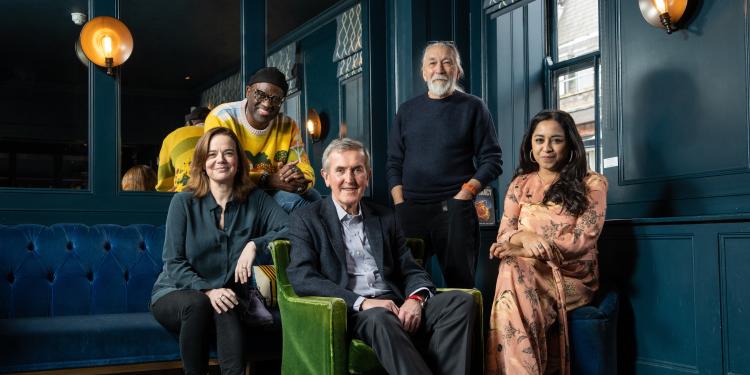

The Booker Prize 2022 judges
Cultural historian, writer and broadcaster Neil MacGregor chairs the Booker Prize 2022 panel of judges and is joined by academic and broadcaster Shahidha Bari; historian Helen Castor; novelist and critic M John Harrison; and novelist, poet and professor Alain Mabanckou
The Booker Prize 2022 shortlist is announced on 6 September and the winner on 17 October.
Each year, the prize is awarded to what is, in the opinion of the judges, the best sustained work of fiction written in English and published in the UK and Ireland between 1 October 2021 and 30 September 2022. The winner will receive £50,000.
Founded in the UK in 1969, the prize initially rewarded Commonwealth writers and now spans the globe: it is open to anyone regardless of origin.
Photo above by Hugo Glendinning.
Gaby Wood, Director of the Booker Prize Foundation, says:
‘It is perhaps a little easy to forget that both Booker Prizes are international. As we’ve seen in the submissions for the Booker Prize year after year, the English language has been hugely enriched by a global sensibility – whether it’s a winning London novelist influenced by a Māori author, a Turk writing in English under the star of James Baldwin or Scots dialect first published in New York. And the prize has a global impact: the shortlistees and winners are celebrated all over the world.
‘This year’s panel is composed of superb readers who have an innate understanding of that global scope, yet are steeped in the history and literature of Britain. They are experts in the porous boundaries of genre, and in the exchange of literary traditions. I can’t wait to see what they recommend.’
Chair of judges, Neil MacGregor, adds:
‘“We tell ourselves stories in order to live”. Over the last year, as book sales surged, Joan Didion’s words were shown to be truer than ever. A large part of the world now writes and reads those necessary stories, about who we are and who we might become, in English: so to be asked to survey this year’s harvest for the Booker Prize is to be invited to inhabit many different universes. And it is a great privilege to be asked to do so in the company of such distinguished judges, who themselves write — in a rich range of traditions — about worlds real and imagined.’

Gaby Wood
© Clara MoldenThe judging panel will be looking for the best work of long-form fiction, selected from entries published in the UK and Ireland between 1 October 2021 and 30 September 2022.
The winner of the £50,000 prize will be announced in November 2022.
The 2021 winner, The Promise by Damon Galgut — hailed by the Financial Times as ‘a complex, ambitious, brilliant work’ — was celebrated internationally by booksellers, the media and readers alike. The Promise details the interconnected relationships between the members of a diminishing white South African family through the sequential lens of four funerals, with The Guardian describing Galgut as ‘a vital, nuanced chronicler of the deep hurts of South Africa, past and present’ when reflecting on his win. The morning after the announcement, the book was number one on Amazon’s bestseller chart. Two weeks after the win, Chatto & Windus announced that it had reprinted 153,000 copies of The Promise, having sold 23,878 copies in hardback, 14,622 of which sold in the two weeks following the news, a 1,925% jump in volume compared with the two weeks before.
The Booker Prize is sponsored by Crankstart, a charitable foundation
Neil MacGregor.
© Hugo Glendinning


